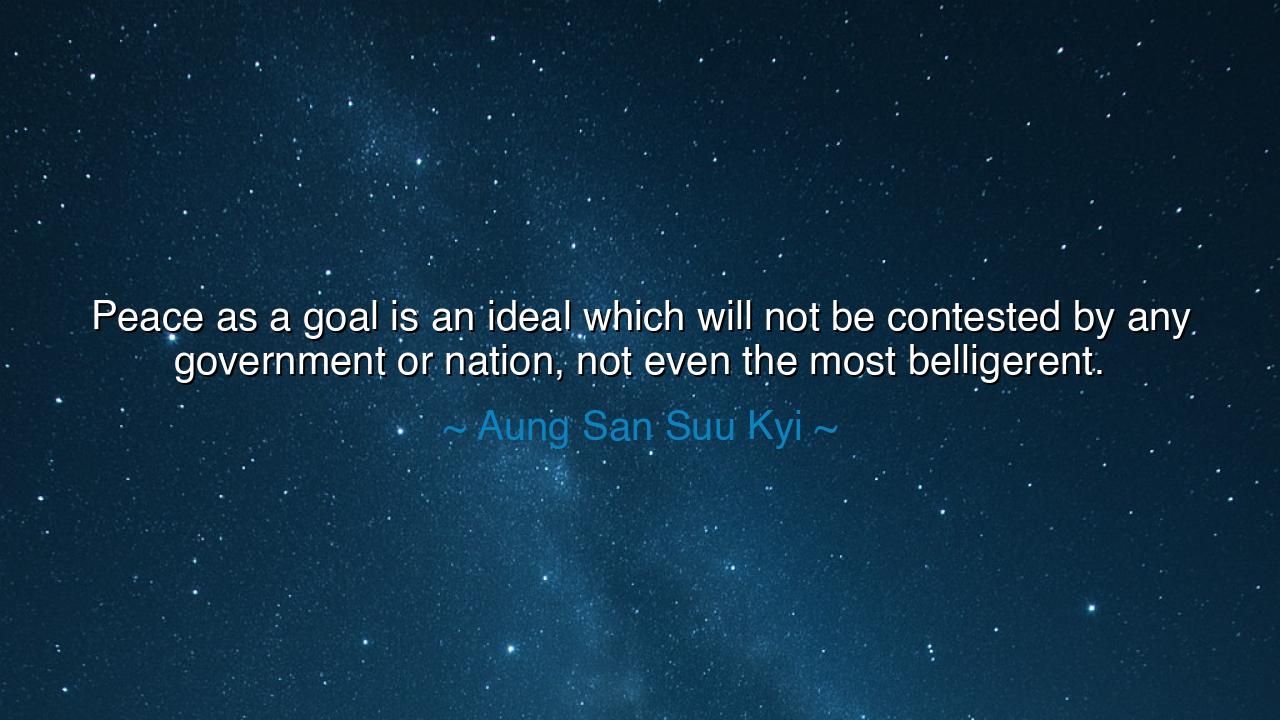
Peace as a goal is an ideal which will not be contested by any
Peace as a goal is an ideal which will not be contested by any government or nation, not even the most belligerent.






“Peace as a goal is an ideal which will not be contested by any government or nation, not even the most belligerent.” Thus spoke Aung San Suu Kyi, the daughter of Burma’s independence hero and herself a symbol of her nation’s long struggle for freedom. Her words rise like a calm river after a storm — gentle in tone, yet carrying a profound truth. In them, she reveals the paradox of human politics: that even the most violent and warlike powers speak the language of peace, even when their hands are stained with conflict. No ruler, no state, no army ever declares itself an enemy of peace. And yet, the world bleeds. Her observation is not cynical, but wise — a reminder that while all proclaim peace as their goal, few have the courage or humility to live its meaning.
The origin of this quote comes from the years when Aung San Suu Kyi was imprisoned in her own home by the ruling military junta of Myanmar. She, a woman of quiet strength, endured years of isolation for daring to speak the truth. During that time, she reflected deeply on the nature of power, justice, and peace, and how easily noble ideals can be corrupted by ambition. This statement emerged from those meditations — a gentle but cutting insight into the hypocrisy of nations. For in every age, governments have cloaked their wars in the language of peace, claiming that they fight only to secure it. Yet, Suu Kyi, a student of both Eastern philosophy and Western democracy, understood that peace proclaimed is not peace practiced; that the mere utterance of the word does not absolve the spirit of violence.
When she says that peace “will not be contested by any government or nation,” she unveils a universal truth: that peace has become the rhetoric of all and the pursuit of few. Every tyrant speaks of peace even as he sends armies into battle; every conqueror claims to seek order even as he sows chaos. History abounds with examples. Emperors, presidents, and generals have raised the banner of peace to justify invasion, occupation, or domination. The Roman legions once called their empire’s expansion Pax Romana — the Roman Peace — though it was built upon conquest and slavery. Centuries later, powers at war called their bombs instruments of liberation. Suu Kyi’s words, then, are a mirror held up to humanity’s face: we all speak peace, yet we rarely walk its path.
Consider the story of Mahatma Gandhi, who stood against an empire not with the sword, but with the strength of spirit. He, too, saw that all governments claim to desire peace, yet none trust their people enough to achieve it through nonviolence. Gandhi’s movement revealed that true peace cannot be granted from above; it must rise from within. He taught that peace is not the absence of war, but the presence of justice. So too did Suu Kyi, in her own way, echo this truth. For she knew that governments which claim to love peace while denying freedom are merely guarding their own power, not the peace of their people.
There is in her statement a kind of sorrowful wisdom — the recognition that peace, though universally praised, is seldom understood. It is easy to speak of peace when it is abstract, far away, theoretical. But real peace requires sacrifice: the renunciation of pride, the surrender of vengeance, the patience to listen. Nations often avoid these costs, preferring the illusion of peace to its reality. Thus, the most belligerent nations are often those that talk most about harmony, for in their hearts they seek not peace but dominance disguised as order. Suu Kyi’s insight reminds us that until truth and compassion rule the hearts of men, even peace will be used as a weapon.
Yet her tone is not that of despair. Beneath her words lies hope, for she affirms that peace remains an ideal — one so noble that none dare contest it openly. This, she suggests, is the seed of salvation. Though the world may twist its meaning, the idea itself remains pure, waiting to be reclaimed. Peace is the one dream that unites all humanity, even its enemies. It is the light that shines in every creed, every culture, every conscience. And because no nation dares to reject it, there remains always the possibility of awakening — that one day humanity might strive not merely to speak of peace, but to live it.
Therefore, O listener, take this wisdom as your own. Let peace not be a word upon your lips, but a discipline within your heart. Do not wait for governments to create it — build it within your home, your community, your soul. Resist the temptation to seek peace through control or domination; seek it through understanding and humility. For as Suu Kyi teaches, even the most belligerent rulers will praise peace, but only the courageous will practice it. Be among the courageous.
And remember this: peace is not the prize at the end of struggle — it is the path itself. It begins where anger ends, and where love takes root. If each person governs the realm of their own heart with justice and compassion, then no tyranny, no empire, no government will stand against it. For peace, though often betrayed, is immortal — the one ideal that cannot die, for it is written into the soul of all who still believe in the better angels of humankind.






AAdministratorAdministrator
Welcome, honored guests. Please leave a comment, we will respond soon